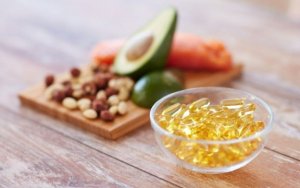Omega-3 Supplements, are they Really Necessary?

Omega-3 supplements have gained popularity in recent years and have become essential for many people. What’s the difference between obtaining this nutrient from a food source and getting it in the form of a capsule? Is it equally effective? We’ll answer all your questions in this article.
What is Omega-3?
Before analyzing the effectiveness and the necessary consumption of Omega-3 supplements, it’s important to know a little more about this nutrient.
To begin with, you should know that Omega-3 is a healthy fat that’s classified as essential for the body. This is because our body needs this nutrient to perform all functions, but it doesn’t produce it on its own.
Therefore, it is essential to consume Omega-3 in your daily diet. There are two ways to do it, the first one is through the foods that contain it. As you will see below, they are many, so it’s not difficult to reach the recommended daily amount. The second way to ingest Omega-3 is from food supplements.
Supplements have become popular in recent years and supposedly have multiple benefits for the body. Up next, we will analyze the effectiveness of these supplements and help you to decide if you should take them.
Omega-3 supplements efficacy
Currently, there is a wide variety of supplements available on the market. Capsules filled with all kinds of nutrients that promise to perform the same function as eating the food that contains them. We can describe the results they promise as miraculous, but are they really as effective as their manufacturers claim?

In the case of Omega-3 supplements, there are several experiments that have proven their ineffectiveness. The subjects who received these supplements had the same results as those people who had only been given placebos.
This is because our bodies don’t absorb Omega-3 in the same way as when it comes from a food source rather than when it’s taken in isolation. The conclusion is clear: Omega-3 supplements do not have the same efficacy. The best way to provide the body with this essential nutrient is through the foods that contain it.
Foods rich in Omega-3
After talking about the effectiveness of Omega-3 supplements, it’s clear that the best way to provide the body with this nutrient is through the foods that contain it.
We will now tell you about these foods and the different ways of consuming them. You will see for yourself, it’s very easy to ingest them because they can be eaten at any time of the day and they’re very diverse:
- Seafood: one of the main sources of Omega-3 and you can find it to a greater extent in species such as spider crab or shrimp. They are common among the most special and elaborate meals, but you can also eat them in a salad and use them to create a light dinner.

- Peanut butter: although it’s becoming more popular, Americans consume more peanut butter than Europeans. It’s a popular notion that peanut butter is unhealthy, but the reality is that it contains 10 percent of Omega-3. If you consume it in moderation, it’s perfect for spreading on toast for breakfast or as a snack.
- Flaxseed oil: all vegetable oils contain Omega-3, but out of all of them, we’ve highlighted flaxseed oil because half of its composition is this nutrient. While it’s not widely known, it isn’t any less healthy.
- Lettuce and spinach: most of the nutrients that contain Omega-3 are of animal origin, but some green leafy vegetables such as lettuce or spinach also standout. They’re perfect for day-to-day recipes and also have very little caloric content.
- Avocado: It is considered a superfood because of its high content of healthy fats and Omega-3. It’s perfect for making salads, toast, or sandwiches. Its options are endless and it mixes well with any recipe.
Now that you know that Omega-3 supplements lack any kind of effectiveness, you just have to take note of those foods that contain this nutrient. It’s the only way to provide our bodies with this essential element.
Omega-3 supplements have gained popularity in recent years and have become essential for many people. What’s the difference between obtaining this nutrient from a food source and getting it in the form of a capsule? Is it equally effective? We’ll answer all your questions in this article.
What is Omega-3?
Before analyzing the effectiveness and the necessary consumption of Omega-3 supplements, it’s important to know a little more about this nutrient.
To begin with, you should know that Omega-3 is a healthy fat that’s classified as essential for the body. This is because our body needs this nutrient to perform all functions, but it doesn’t produce it on its own.
Therefore, it is essential to consume Omega-3 in your daily diet. There are two ways to do it, the first one is through the foods that contain it. As you will see below, they are many, so it’s not difficult to reach the recommended daily amount. The second way to ingest Omega-3 is from food supplements.
Supplements have become popular in recent years and supposedly have multiple benefits for the body. Up next, we will analyze the effectiveness of these supplements and help you to decide if you should take them.
Omega-3 supplements efficacy
Currently, there is a wide variety of supplements available on the market. Capsules filled with all kinds of nutrients that promise to perform the same function as eating the food that contains them. We can describe the results they promise as miraculous, but are they really as effective as their manufacturers claim?

In the case of Omega-3 supplements, there are several experiments that have proven their ineffectiveness. The subjects who received these supplements had the same results as those people who had only been given placebos.
This is because our bodies don’t absorb Omega-3 in the same way as when it comes from a food source rather than when it’s taken in isolation. The conclusion is clear: Omega-3 supplements do not have the same efficacy. The best way to provide the body with this essential nutrient is through the foods that contain it.
Foods rich in Omega-3
After talking about the effectiveness of Omega-3 supplements, it’s clear that the best way to provide the body with this nutrient is through the foods that contain it.
We will now tell you about these foods and the different ways of consuming them. You will see for yourself, it’s very easy to ingest them because they can be eaten at any time of the day and they’re very diverse:
- Seafood: one of the main sources of Omega-3 and you can find it to a greater extent in species such as spider crab or shrimp. They are common among the most special and elaborate meals, but you can also eat them in a salad and use them to create a light dinner.

- Peanut butter: although it’s becoming more popular, Americans consume more peanut butter than Europeans. It’s a popular notion that peanut butter is unhealthy, but the reality is that it contains 10 percent of Omega-3. If you consume it in moderation, it’s perfect for spreading on toast for breakfast or as a snack.
- Flaxseed oil: all vegetable oils contain Omega-3, but out of all of them, we’ve highlighted flaxseed oil because half of its composition is this nutrient. While it’s not widely known, it isn’t any less healthy.
- Lettuce and spinach: most of the nutrients that contain Omega-3 are of animal origin, but some green leafy vegetables such as lettuce or spinach also standout. They’re perfect for day-to-day recipes and also have very little caloric content.
- Avocado: It is considered a superfood because of its high content of healthy fats and Omega-3. It’s perfect for making salads, toast, or sandwiches. Its options are endless and it mixes well with any recipe.
Now that you know that Omega-3 supplements lack any kind of effectiveness, you just have to take note of those foods that contain this nutrient. It’s the only way to provide our bodies with this essential element.
This text is provided for informational purposes only and does not replace consultation with a professional. If in doubt, consult your specialist.








